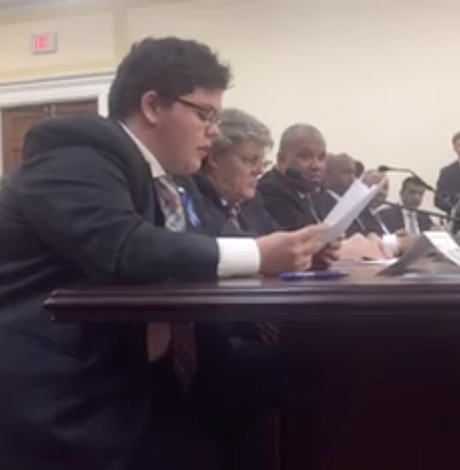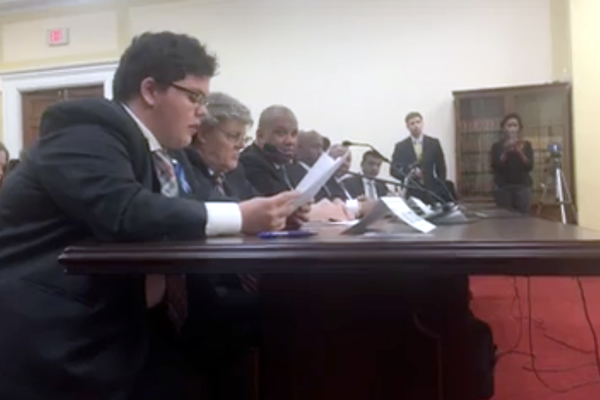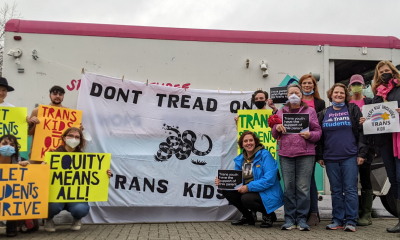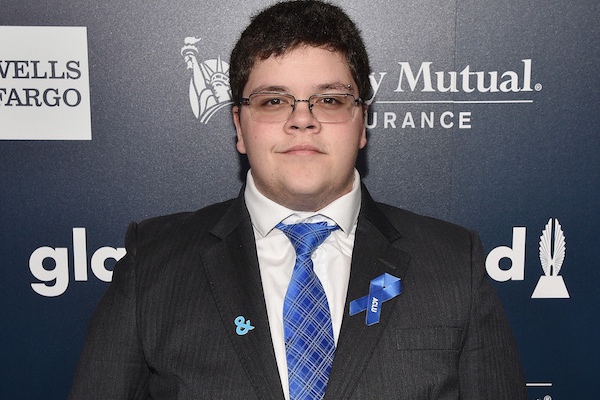News
Gavin Grimm testifies on civil rights after 100 days of Trump
Panel witness decry review of consent decrees, voter ID laws


Gavin Grimm testifies before Congress on April 6, 2017. (Screen capture courtesy Washington Blade Facebook)
Transgender student Gavin Grimm testified before Congress Thursday on the experience of his Virginia high school denying him access to the bathroom consistent with the gender identity as well as harms the Trump administration’s withdrawal of pro-trans guidance has caused for transgender people.
Gavin made the remarks during a congressional forum hosted by U.S. House Democrats on the state of civil rights after the first 100 days of the Trump administration. Witnesseses sharply criticized the Trump administration — in particular the U.S. Justice Department under U.S. Attorney General Jeff Sessions — for failing to live up to equal protection under the law.
Currently suing his school for bathroom access in a lawsuit the U.S. Supreme Court was once poised to consider, but later rejected, Gavin recalled the pain he felt during hearings in which the Gloucester County School Board decided to refuse to treat him consistent with his gender identity.
“World had spread throughout the community, and people turned up in droves,” Gavin said. “After each frenzied remark, clapping and hollering reverberated throughout the room. I sat while people called me a freak. I sat while my community got together to banish a child from public life for the crime of harming no one. I sat while my school board voted to banish me to retrofitted broom closets or the nurse’s room.”
As Gavin narrated his story, the microphone system for the room in the Rayburm House Office Building cut out, prompting one forum participant to quip, “The Democrats do not control this room.” Invited by Rep. John Conyers (D-Mich.), who was chairing the forum, to speak closer to the dais from a podium, Gavin continued his story.
Recalling the pledge from the White House that President Trump would be “respectful and supportive of LGBTQ rights,” Gavin said the administration’s decision to nix Obama-era guidance assuring transgender kids bathroom access in accordance with their gender identity “could not have been more damaging for trans youth.”
“The guidance had a very simple message: Treat trans students with dignity and respect them for who they are,” Gavin said. “Treating trans students with dignity and respect should not be controversial. The decision to withdraw the guidance sent a terrible message to some of the most vulnerable people that President Trump – the leader of our country – and his administration do not care about protecting you from discrimination.”
After Gavin completed his testimony, attendees at the forum clapped for a lengthy amount of time. Conyers commended him, saying he’s a “courageous young man and you deserve our support and applause.”
Catherine Lhamon, chair of the U.S. Commission on Civil Rights and former assistant secretary for civil rights at the Education Department under the Obama administration, made the transgender guidance rollback a major point of concern during testimony in which she said civil rights under the Trump administration has been “horrendous.”
“It will not surprise this body that that withdrawal offended me because I signed that guidance when I was assistant secretary of civil rights,” Lhamon said.
Lhamon called Trump administration claims the guidance was withdrawn because of improper procedure and incorrect interpretation of Title IX of the Education Amendments of 1972 “categorically untrue,” citing “the many years that all the relevant agencies” spent investigating the facts and speaking the school administrators.
“To think more that whether a federal law that Congress wrote that says explicitly that no person in the United States shall be subject to sex discrimination in school applies to transgender students questions the very humanity of transgender students,” Lhamon said.
Lhamon also took issue with the appointment of Roger Severino, a former researcher for the anti-LGBT Heritage Foundation, to the role of assistant secretary for civil rights at the Department of Health & Human Services. Once in the position of being critical of the Obama administration’s efforts to ensure transgender people have access to transition-related care, Severino will now be charged with protecting transgender people in health care.
“I will never forget how I heard from former HHS civil rights director about a case in which emergency medical professionals refused to treat a transgender women because she is transgender,” Lhamon said. “She later died, although she had a better than 35 percent of survival had she received appropriate and timely medical care. It should go without saying that the director of HHS civil rights should be committed to ensure the fair medical treatment for all persons, regardless of identity status.”
The issue of transgender rights was but one issue before the forum that sought to address the multitude of challenges the civil rights community after 100 days of the Trump administration.
Conyers, the top Democrat on the House Judiciary Committee, expressed a dismal view of the current state of civil rights as he chaired the forum, referencing a “documented loss in the overall climate of equality” and rise in hate violence since the 2016 election.
“Minority communities have been justifiably concerned about the continued role of the federal government in protecting civil rights,” Conyers said. “The Trump presidential campaign promised meaningful changes that would benefit minorities in the area of crime, equal justice and economic equality, his political allies and surrogates to the media have sent a different message that served to heighten national divisions and anxiety.”
DOJ criticized for consent decree review
A central issue was the decision this week of U.S. Attorney General Jeff Sessions to review the consent decrees the U.S. Justice Department had arranged with police departments after patterns of unconstitutional racial discrimination and excessive force, including the shootings of black men.
Chiraag Bains, senior fellow at Harvard Law School Criminal Justice Policy Program and former senior counsel to the assistant attorney general for civil rights under President Obama, cited the review as evidence the Justice Department has been “predictably disastrous” on civil rights.
“This administration insists that policing is a purely local matter into which the federal government should not intrude,” Bains said. “But we’re not talking about a federal takeover of these departments. We’re talking about the enforcement and protection of constitutional rights. There is no federalism problem.”
Ron Davis, former director of the Office of Community Oriented Policing Services at the Justice Department, invoked the words of 19th Century British statesman Robert Peel to describe the appropriate relationship between the police and communities as defined under the consent decrees.
“People comply with the law not because of they are afraid of the police, they comply with the law because they believes the law is fair, just and will be enforced appropriately and without bias,” David said. “People should be afraid of police. They should not have to run from them because they’re going to be deported or think that every infraction will result in arrest.”
But Sessions’ order to review the consent decrees was but one issue to witnesses pointed as evidence the Trump administration was failing to live up to responsibilities on civil rights.
Joe Rich, co-director of the Fair Housing & Community Development Project, raised as a civil rights issue the rollback of voter access to the polls, including early voting cutbacks and the imposition of state voter ID laws.
Although defenders of those laws say they’re intended to prevent voter fraud, Rich said that’s “very rare,” citing a recent study that found the incident rate of voter fraud ranges between .003 percent and .0025 percent.
“Given this tiny incident rate for voter impersonation, the report concluded that is more likely that an American will be struck by lightning than he will impersonate voter at the poll,” Rich said.
Rich said the Justice Department had “vigorously prosecuted” against the voter ID law in Texas for three years, but the U.S. government has “reversed course” with Sessions at the helm in “an action of great concern for all of us doing voting rights work.”
Roy Austin, former director of the White House Office of Urban Affairs, Justice & Opportunity under the Obama administration, took particular issue with the travel ban Trump signed barring immigration into the United States from six Muslim countries, calling it an attempt to “legalize discrimination against an entire faith.”
Although the administration billed the measure as an means to keep potential terrorists from the United States, Auston said “state-endorsed discrimination diminishes public safety.”
“In my humble opinion, this greatest current threat to civil rights in this great nation is this current administration,” Austin said. “In record time, the current administration has already shown not simply a willingness to not defend civil rights, but a shown an intent to violate civil rights, and, at a minimum, with an intent to make it easier for others to violate civil rights.”
Chief Hassan Aden, a member of the steering committee for Law Enforcement Leaders to Reduce Crime and Incarceration and former chief of police of the Greenville Police Department, took issue with greater authority of U.S. Customs & Border Protection to detain travelers entering the United States.
“What’s happening now is there’s sort of this second-class of American citizen being built out, and it involves names and religious preferences, and it’s something that we all need to resist and work against,” Aden said.
Aden recalled his own experienced this year being detained by CBP at JFK International Airport upon re-entry into the United States, which attributed to his Muslim-sounding name. Aden said this incident stands out because he travelled internationally in years past, including five times last year, without issue.
“My name being Hassan Aden, I think, set off a flag,” Aden said. “I utilized my platform and my reach to highlight this issue and give it a voice. There are so many people that this happens to. My detention was 90 minutes. There are people whose detention is significantly longer.”
Rep. Sheila Jackson Lee (D-Texas) held nothing back in her assessment of Trump on civil rights in the wake of the Justice Department reviewing consent decrees with police departments.
“This may be the Armageddon,” Lee said. “We may be seeing the most dangerous Department of Justice that we have seen in decades. I don’t think it is hyperbole; I don’t think it’s hysteria.”
Referencing the plight Gavin continues to face by being denied bathroom access in his school, Lee assured him, “You are not alone. We know the decision of the Supreme Court, but we’re not finished with bringing you relief.”
Other lawmakers present at the hearing were Rep. Bobby Scott (D-Va.), top Democrat for the House Committee on Education and the Workforce; Rep. Cedric Richmond (D-La.), chair of the Congressional Black Caucus; and Rep. Eddie Bernice Johnson (D-Texas).
At the end of the hearing, Lee asked Gavin for his thoughts on the impact of the Justice Department taking an ideological position against transgender rights, which Gavin would only be harmful.
“We see a very real and immediate negative impact on those communities,” Gavin said. “The transgender community is uniquely vulnerable already in that we have less legal protection, we have a higher rate of hate crimes, mental illness, homelessness, unemployment, and then to have a complete and total lack of administrative support, and, in fact, a presence of a administrative intimidation or disregard, the effects of such a negative message across the board would be absolutely devastating.”
District of Columbia
Taste of Point returns at critical time for queer students
BIPOC scholar to speak at Room & Board event on May 2

The Point Foundation will kick off May with its annual Taste of Point DC event. The event will be hosted at Room & Board on 14th Street and feature a silent auction, food tastings, a speech from a scholar, and more.
Point’s chief of staff, Kevin Wright, said that at Taste of Point, the scholars are the star of the show.
“People never come to an event to hear Point staff speak, they come to hear from the people most impacted by the program,” he said. “At its core Taste of Point is designed to center and highlight our scholars’ voices and experiences.”
This year, a Point BIPOC Scholar, Katherine Guerrero Rivera will speak at the event.
“It is a great opportunity to highlight the scholars out there on the front lines making impacts in almost every sector and job field,” Wright said.
Wright pointed out that this year especially is a pivotal time for LGBTQ students.
“In 2023, there were 20 states that passed anti-LGBTQ legislation,” he said. “By this point in [2024] we already have more.”
Wright said the impacts of those legislative attacks are far reaching and that Point is continuously monitoring the impact they have on students on the ground.
Last month, The Washington Post reported that states with anti-LGBTQ laws in place saw school hate crimes quadruple. This report came a month after a non-binary student, Nex Bennedict, died after being attacked at school.
“So, we see this as a critical moment to really step up and help students who are facing these challenges on their campus,” Wright said. “Our mission is to continue to empower our scholars to achieve their full academic and leadership potential.”
This year Point awarded nearly 600 LGBTQ students with scholarships. These include the flagship scholarship, community college scholarship and the BIPOC scholarship. When the foundation started in 2002, there were only eight scholarships awarded.
Dr. Harjant Gill is one of those scholars who said the scholarship was pivotal for him. Gill said he spent his undergraduate years creating films and doing activism for the LGBTQ community.
As a result, his academic record wasn’t stellar and although he was admitted into American University’s graduate program he had no clue how he would fund it.
Upon arrival to American he was told to apply for a Point scholarship and the rest was history.
“It ended up being the one thing that kept me going otherwise I would have dropped out,” he said. “Point was incredibly instrumental in my journey to becoming an academic and a professor.”
More than a decade later, Gill serves on the host committee for Taste of Point and is a mentor to young Point scholars. He said that he donates money yearly to Point and that when he is asked what he wants for a gift he will often tell his friends to donate too.
To attend the event on Wednesday, May 2, purchase tickets at the Point website. If you can’t attend this year’s Taste of Point DC event but would like to get involved, you can also donate online.
State Department
State Department releases annual human rights report
Antony Blinken reiterates criticism of Uganda’s Anti-Homosexuality Act

Secretary of State Antony Blinken on Monday once again reiterated his criticism of Uganda’s Anti-Homosexuality Act upon release of the State Department’s annual human rights report.
“This year’s report also captures human rights abuses against members of vulnerable communities,” he told reporters. “In Afghanistan, the Taliban have limited work opportunities for women, shuttered institutions found educating girls, and increasing floggings for women and men accused of, quote, ‘immoral behavior,’ end quote. Uganda passed a draconian and discriminatory Anti-Homosexuality Act, threatening LGBTQI+ individuals with life imprisonment, even death, simply for being with the person they loved.”
Ugandan President Yoweri Museveni last May signed the law, which contains a death penalty provision for “aggravated homosexuality.”
The U.S. subsequently imposed visa restrictions on Ugandan officials and removed the country from a program that allows sub-Saharan African countries to trade duty-free with the U.S. The World Bank Group also announced the suspension of new loans to Uganda.
Uganda’s Constitutional Court earlier this month refused to “nullify the Anti-Homosexuality Act in its totality.” More than a dozen Ugandan LGBTQ activists have appealed the ruling.
Clare Byarugaba of Chapter Four Uganda, a Ugandan LGBTQ rights group, on Monday met with National Security Council Chief-of-Staff Curtis Ried. Jay Gilliam, the senior LGBTQI+ coordinator for the U.S. Agency for International Development, in February traveled to Uganda and met with LGBTQ activists who discussed the Anti-Homosexuality Act’s impact.
“LGBTQI+ activists reported police arrested numerous individuals on the basis of their sexual orientation or gender identity and subjected many to forced anal exams, a medically discredited practice with no evidentiary value that was considered a form of cruel, inhuman, and degrading treatment and could amount to torture,” reads the human rights report.
The report, among other things, also notes Ugandan human rights activists “reported numerous instances of state and non-state actor violence and harassment against LGBTQI+ persons and noted authorities did not adequately investigate the cases.”
Report highlights anti-LGBTQ crackdowns in Ghana, Hungary, Russia
Ghanaian lawmakers on Feb. 28 approved the Promotion of Proper Human Sexual Rights and Ghanaian Family Values Bill. The country’s president, Nana Akufo-Addo, has said he will not sign the measure until the Ghanaian Supreme Court rules on whether it is constitutional or not.
The human rights report notes “laws criminalizing consensual same-sex sexual conduct between adults” and “crimes involving violence or threats of violence targeting lesbian, gay, bisexual, transgender, queer or intersex persons” are among the “significant human rights issues” in Ghana.
The report documents Hungarian Prime Minister Viktor Orbán and members of his right-wing Fidesz party’s continued rhetoric against “gender ideology.” It also notes Russia’s ongoing crackdown against LGBTQ people that includes reports of “state actors committed violence against LGBTQI+ individuals based on their sexual orientation or gender identity, particularly in Chechnya.”
The report specifically notes Russian President Vladimir Putin on July 24 signed a law that bans “legal gender recognition, medical interventions aimed at changing the sex of a person, and gender-affirming care.” It also points out Papua New Guinea is among the countries in which consensual same-sex sexual relations remain criminalized.

The Cook Islands and Mauritius in decriminalized homosexuality in 2023.
The report notes the Namibia Supreme Court last May ruled the country must recognize same-sex marriages legally performed outside the country. The report also highlights the Indian Supreme Court’s ruling against marriage equality that it issued last October. (It later announced it would consider an appeal of the decision.)
Congress requires the State Department to release a human rights report each year.
The Biden-Harris administration in 2021 released a memorandum that committed the U.S. to promoting LGBTQ+ and intersex rights abroad.
The full report can be read here.

Dominica’s High Court of Justice on Monday struck down provisions of a law that criminalized consensual same-sex sexual relations.
A gay man who remains anonymous in 2019 challenged sections of the country’s Sexual Offenses Act that criminalized anal sex and “gross indecency” with up to 10 years and 12 years in prison respectively. The plaintiff argued the provisions violated his constitutional rights.
The Dominica Equality and Sexual Expression Association and the Eastern Caribbean Alliance for Diversity and Equality, a group that advocates for LGBTQ and intersex rights in the region, in a press release noted the court in its ruling affirmed “the criminalization of consensual same-sex activity between adults is unconstitutional.” The groups added Justice Kimberly Cenac-Phulgence “declared that the laws commonly known as buggery and gross indecency laws, contravenes the constitution of the Commonwealth of Dominica, namely the right to liberty, freedom of expression, and protection of personal privacy.”
“It is long past time that the dignity and dreams of all Dominicans were recognized,” said DESEA Executive Director Sylvester Jno Baptiste in the press release. “We are all God’s children, and he loves us all equally. Laws that treat some Dominicans as less than others, have no place in a just society.”
Dominica is a former British colony that is located between Guadeloupe and Martinique in the Lesser Antilles.
Antigua and Barbuda, St. Kitts and Nevis, Barbados, and Trinidad and Tobago in recent years have decriminalized consensual same-sex sexual relations.
The Inter-American Commission on Human Rights in 2021 issued a decision that said Jamaica must repeal its colonial-era sodomy law. The country’s Supreme Court last year ruled against a gay man who challenged it.
A judge on St. Vincent and the Grenadines’s top court in February dismissed two cases that challenged the country’s sodomy laws.
“Decriminalization helps create an environment where LGBTQ individuals can live openly without fear of persecution, enabling them to access health care, education, and employment without facing discrimination,” said Outright Executive Director Maria Sjödin on Monday in response to the Dominica ruling. “The repeal of these discriminatory laws is a testament to the tireless efforts of activists, advocates, and allies who have long fought for justice and equality. It is a victory for human rights and a significant milestone in the ongoing struggle for LGBTQ rights in the Caribbean.”
-

 South America3 days ago
South America3 days agoDaniel Zamudio murderer’s parole request denied
-

 Maryland4 days ago
Maryland4 days agoMontgomery County police chief discusses arrest of trans student charged with planned school shooting
-

 Politics5 days ago
Politics5 days agoCourt records raise concerns about right-wing TikTok investor’s influence
-

 Commentary4 days ago
Commentary4 days agoWorld ‘isn’t much different today’











